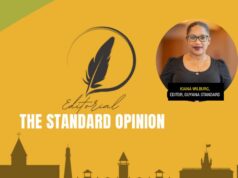You go to the supermarket, and the bill—for basic groceries—comes up to the equivalent of the proverbial arm and a leg. As you pay, focus every bit of your attention outside the window. Comfort yourself, the roads! Look at the beautiful roads! You may not be able to save for months, but hey, the drive home will be smooth.
A colleague mentioned this to me some time ago, as we discussed the rising cost of living. I recalled the scenario a few days ago when U.S. Secretary of State, Marco Rubio spoke about the substandard roads in Guyana. Rubio said, “I just came from Guyana where you had to drive on a road that the Chinese built…we almost all had concussions. The road was so bad; it was terrible.
“They (Guyana) paid these people to build this road…We want countries to have an alternative to that. If you’re going to build a road, I want you to have a real one. They (Guyanese) were better off on a dirt road than the road we were just on.” *
Hearing what Rubio had to say, I immediately pictured the expression on the faces of those who have to commute on the “concussion road” after suffering heartache at the supermarket.
Then, another thing happened. The Chinese indirectly responded to Rubio. The Chinese embassy in Guyana said, “We congratulate Guyana on what it has achieved in its modernization drive. Rome wasn’t built in a day.”
The sentiments expressed by both of these world powers capture exactly what right-thinking Guyanese have been trying to tell our politicians. We want quality, and not everything conceivable has to be done at the same time.
The APNU+AFC government was heavily criticized for its “consumption budget”, where huge lump sums were allocated for current expenditures, like dietary. PPP leaders have a proclivity to condemn their APNU+AFC counterparts with taunts like, “yall didn’t build anything…”, “Durban Park is your legacy,” and, “remember the plantain chip economy.”
Now, with the PPP in control of the nation’s purse, capital expenditure is it. Once there is something to be built, the PPP is poised to build it. Guyana has moved from one extreme to the next. The populace ousted a government that had not built a single hospital, to one that sees it prudent to build 12 hospitals simultaneously while rehabilitating another six. But what we need, as the Jamaican singer echos is, “balance!”
Guyana’s rapid pace of infrastructural development includes the simultaneous construction and rehabilitation of thousands of roads. The nation is also constructing gas to energy plants, water plants, ports, parks, bridges, stadia and other facilities.
Infrastructure is necessary, but all at once is just ludicrous. It makes the cost of infrastructure more expensive from every standpoint conceivable—economic, productivity, well-being etc.
A middle ground, a balance, would be to build 4 hospitals instead of 12. We can then allocate some of the money to a national nurses and doctors drive, where we incentivize appropriately qualified individuals to attend the University of Guyana and other recognised universities. We can allocate some of the hospitals’ funds to double our workforce of medical professionals. We can send our best and brightest to become specialists.
With such a scenario, we worry less about oil prices because we have health tourism to fall back on. This tourism will be possible because we have invested in state-of-the-art hospitals, which are manned by our own citizens who have received the right incentives to excel in their respective areas. We need not only the infrastructure. We need to be able to say that Guyana has some of the best neurosurgeons and cardiologists in the region.
We can adopt a similar strategy with education. Of course, all parents want their children to have adequate facilities. Schools and equipment will always be necessary. That’s a given. However, more money and attention need to be directed towards making the education sector more attractive for talented teachers and those who genuinely love teaching. We lose our best teachers simply because they need a livable wage.
Further, we need more specialists. My son has been diagnosed with autism. I have to pay almost a quarter of a million per term to send him to a private school. Before UG became free, I noticed that my brother was paying less for my niece’s tertiary education than I was paying for my 7-year-old blessing. Why is this? Simply because there are not enough trained teachers in the public sector who understand his condition.
Persons with autism are often brilliant; we need the right teachers to nurture those minds. With his recent theatrics, Elon Musk may not be the best example; therefore, I will use Bill Gates. We don’t want to miss out on discovering brilliant minds like Gates simply because their parents cannot afford to send them to private school.
There are many, including this author, who believe that there are key figures in the government who “mean well.” But growing up, my father would say justice must not only be done. It must appear to be done. In this case, it is not enough to believe or even know that our leaders have our best interest at heart. It must appear that way.
Whenever a government displays an obsession with infrastructural projects, it is often, but not always, a signal of corruption, as this is considered one of the most straightforward mechanisms for siphoning off funds.
In Guyana’s case, the PPP government, even before David Granger’s rule, was often accused of corruption. However, during the 2015-2020 period, when all was supposed to be made public, very expensive efforts (such as the State Assets Recovery Agency -SARA) failed to expose and capture those accused of corruption.
Further, Auditor General reports published since PPP returned to Office haven’t exposed the sort of massive corruption that some believe prevails.
If not corruption, what is it? At the feet of which social-ill do we lay blame for this reality of a ridiculous volume of infrastructure in such a short time?
Is over-ambition to blame? Improper planning and rationing of what is most important? I cannot quite say, but what is evident is the nation is being given substandard work and crazy delays while paying big bucks for better.
Infrastructure is essential. It is vital for development and it is supposed to decrease the cost of living while increasing the comfort of living. However, attempting to accomplish everything at once will not achieve those goals; not only does this create room for subpar work, but it also drives up the cost of construction materials, making it harder for those struggling to build a home.
*There was no indication of the specific road to which Secretary of State Rubio was referring. Therefore, it could not be established that it was indeed built by a Chinese contractor.
(Abena Rockcliffe and Brother, Ato Rockcliffe)













